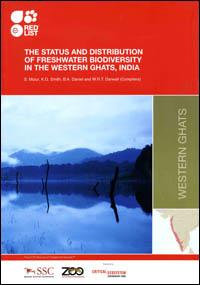The status and distribution of freshwater biodiversity in the Western Ghats, India

Publisher:
Organization(s):
- IUCN Species Survival Commission (SSC)
- IUCN Species Survival Commission (SSC), Dragonfly Specialist Group
- IUCN Species Survival Commission (SSC), Freshwater Biodiversity Assessment Programme
- IUCN Species Survival Commission (SSC), Freshwater Fish Specialist Group
- IUCN Species Survival Commission (SSC), Mollusc Specialist Group
- Zoo Outreach Organisation (ZOO), IN
The Western Ghats is one of the worlds most heavily populated biodiversity hotspots providing for and supporting 400 million people through water for drinking, transport, irrigation, and hydroelectric power, together with food and resources to sustain livelihoods. However, the pace of growth of the Indian economy and rates of industrial and urban development are not in tune with the conservation needs of its diverse freshwater ecosystems and the remarkably high diversity of species they contain. In most instances the development planning process does not consider the requirements of these freshwater ecosystems, mainly due to a lack of adequate information on the distribution and status of freshwater species and the threats they face. There is also little appreciation for the value of freshwater ecosystems to the livelihoods of many highly dependent people, often the poorest in society. In response to this need for information and for raised awareness, the Western Ghats Freshwater Biodiversity Assessment was conducted to review the global conservation status and distributions of 1,146 freshwater species belonging to four taxonomic groups: fishes (290 taxa), molluscs (77 taxa), odonates (171 taxa) and aquatic plants (608 taxa).
Monographic Series:
Includes bibliographic references. Print publication also includes CD-Rom containing an executive summary, an electronic version of the full report, species summaries, species maps, species shapefiles, and species lists.
Keywords:
Geographic keywords:
Scientific name:
Broad subject:
Call number:
Record updated: 2022/05/24
